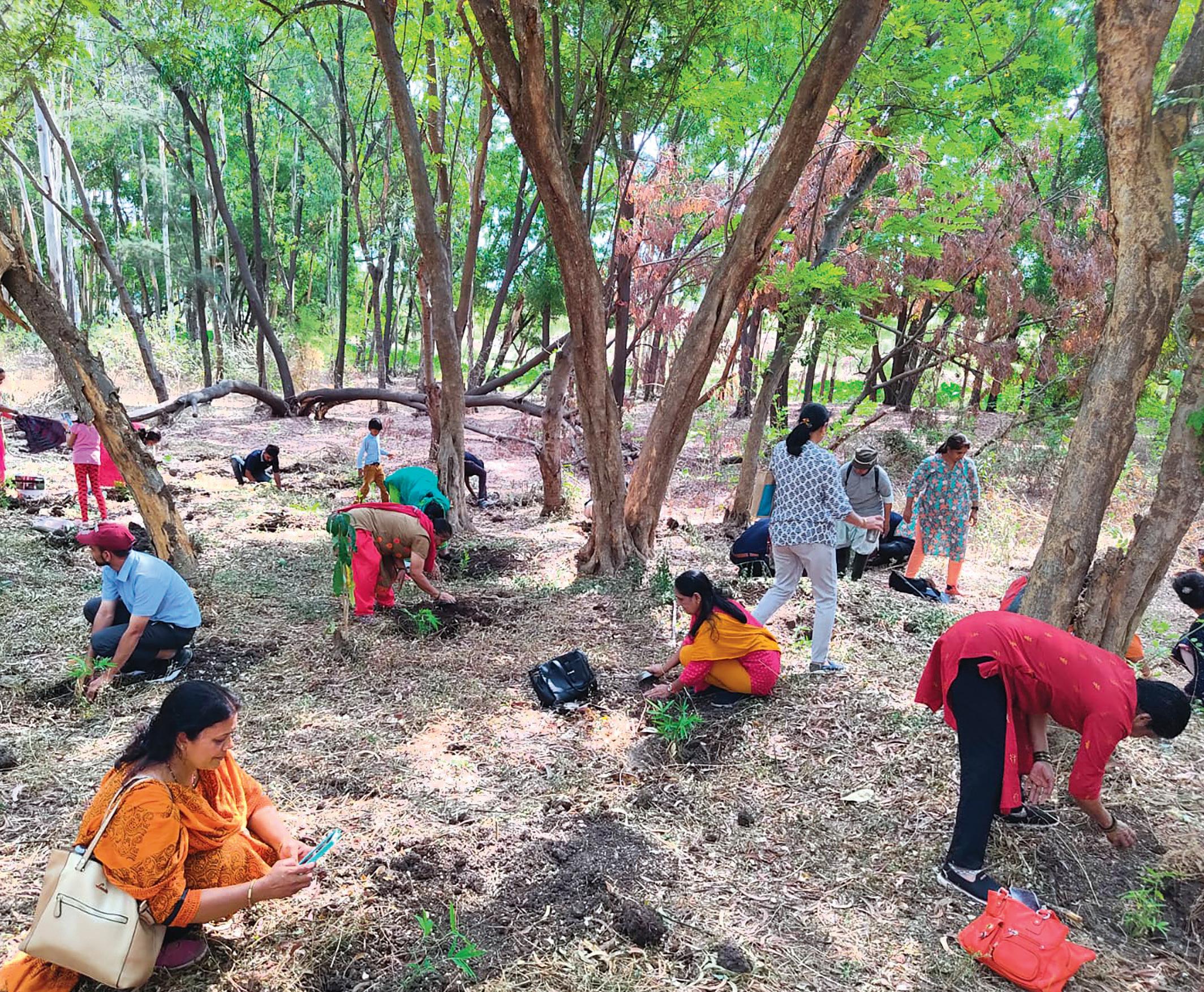Prøve GULL - Gratis
Guardians of forest
Down To Earth
|March 16, 2025
Communities across Maharashtra take on the mantle of biodiversity conservation; replicate sacred groves on common land

SOME 20 KM from Nashik city of Maharashtra is a patch of forest, known as Phaashicha Dongar. As the story goes, this was where the British colonial rulers executed freedom fighters by hanging, and hence the name. As if bearing the burden of the past, the forest patch for decades resembled a barren landscape with a few gliricidia trees here and there. Not anymore. “Today, Phaashicha Dongar hosts more than 33,000 trees belonging to 275 native species. It has also become home to over 70 species of butterflies, 100 species of birds and animals, from peacock to porcupine to monitor lizard, hyena and leopard,” says Shekhar Gaikwad, a resident of Nashik. This transformation has been made possible by nature enthusiasts, citizens groups and students of the city, says Gaikwad, who is at the helm of the initiative.
The 57-year-old has been working for the conservation of trees and landscape restoration for over three decades. From time to time in and around the city, he organises drives to plant trees and water them by roping in volunteers, students and residents' associations. Inspired by his work, the Nashik forest division in 2015 permitted Gaikwad to carry out regeneration activities on a 28 hectare (ha) forest patch at Phaashicha Dongar. That year, on World Environment Day, people from across Nashik joined Gaikwad in restoring the barren forest land, each carrying a native tree sapling and a bottle of water. “About 11,000 native trees of multiple species were planted that day. People also volunteered for regular upkeep of the area,” Gaikwad says, adding that within three years, the number of trees increased threefold and the forest floor was teeming with a thick layer of grass, shrubs and creepers. Birds and wildlife had also returned.
 Managed and maintained by local communities, Phaashicha Dongar is now referred to as
Managed and maintained by local communities, Phaashicha Dongar is now referred to as Denne historien er fra March 16, 2025-utgaven av Down To Earth.
Abonner på Magzter GOLD for å få tilgang til tusenvis av kuraterte premiumhistorier og over 9000 magasiner og aviser.
Allerede abonnent? Logg på
FLERE HISTORIER FRA Down To Earth

Down To Earth
Bitter pill
THE WEB SERIES PHARMA EXPOSES HARSH TRUTHS OF THE PHARMACEUTICAL INDUSTRY, WHERE PROFIT OFTEN BECOMES MORE IMPORTANT THAN HUMAN HEALTH
3 mins
January 16, 2026

Down To Earth
CHAOS IN-DEFINITION
The Aravallis are perhaps India's most litigated hill range. More than 4,000 court cases have failed to arrest their destruction. The latest dispute concerns a narrow legal definition of this geological antiquity, much of which has been obliterated by mining and urban sprawl. While the Supreme Court has stayed its own judgement accepting that definition, it must see the underlying reality and help reconcile development and national security with conservation.
19 mins
January 16, 2026

Down To Earth
BITS: INDIA
Indore has recorded 16 deaths and more than 1,600 hospitalisations between December 24 and January 6.
1 min
January 16, 2026

Down To Earth
GUARANTEE EXPIRES
India's rural employment guarantee law is replaced with a centrally controlled, budget-capped scheme. Is this an attack on the right to work?
3 mins
January 16, 2026

Down To Earth
BLOOM OR BANE
Surge of vibrant pink water lilies in Kuttanad, Kerala, provides socio-economic benefits, but the plant's ecological impacts must be understood
4 mins
January 16, 2026

Down To Earth
INVISIBLE EMPLOYER
Field and academic evidence shows sharp falls in casual agricultural employment at places where groundwater access declines
3 mins
January 16, 2026

Down To Earth
Schemed for erasure
Does the VB-G RAMG Act address structural weaknesses long observed in MGNREGA's implementation?
10 mins
January 16, 2026

Down To Earth
School of change
An open school in Panagar, Madhya Pradesh, aims to protect children of tribal settlements from falling into the trap of addiction
2 mins
January 16, 2026

Down To Earth
PULSE OF RESILIENCE
As a climate-ready crop, cowpea shows potential for widespread use in India
3 mins
January 16, 2026
Down To Earth
BITS GLOBAL
Britain recorded its hottest and sunniest year ever in 2025, the country's meteorological office said on January 2.
1 min
January 16, 2026
Listen
Translate
Change font size
